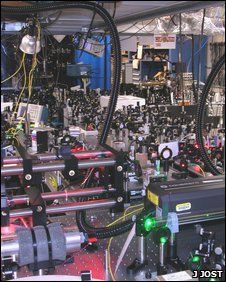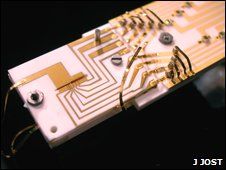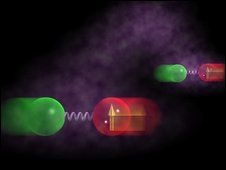Every human endeavor has a bittersweet taste. "A cup of honey no one has yet drunk, without mixing it with a cup of gall", said a Montenegrin nineteenth century bishop, warrior and poet in one of his epics on the struggle of his people against the mighty Ottoman Empire (admittedly, the original reads much better, but then I am a physicist, not a linguist). So it is with science. Last week's issue of Nature contains a beautiful paper by David Wineland's group at NIST in Boulder Colorado, who managed to create the first form of a mechanical entanglement between vibrating pairs of ions. But the same issue of Nature, in another article, reports on the announcement of IARPA (Intelligence Advanced Research Projects Agency, according to Wired "It's like DARPA for Spies") to cut funding for Wineland's experiments. Wineland is among a number of other illustrious US scientists, such as William Phillips, the Nobel Prize Winner for laser cooling, who suffered the same fate.

The said paper by Wineland's group is significant in that it shows entanglement between mechanical vibrational degrees of freedom of two ion pairs. Vibrational entanglement has, of course, been analyzed theoretically many times, but it has never been achieved experimentally before in such a clear and conclusive manner. Wineland's is a very involved and sophisticated experiment, where entanglement is first created between energies of two pairs of ions (which itself is an achievement, though done a number of times before). This is then transferred onto the vibrations, so that ion pairs oscillate in unison, but their degree of correlated motion is higher than anything that can be done by classical oscillators (such as two pendulums). All manipulations are achieved by shining laser pulses of appropriate frequency. Once vibrational entanglement is achieved, its presence is confirmed by the reverse actions. Suitable laser pulses transfer entanglement to the energy degrees of freedom and this is then measured.
Experiments of this type and level of sophistication take decades to achieve. During this time, it is very important to have a sustained level of funding not only for equipment, but also for staff (typically between 5 and 10 physicists are continuously needed to realize something like this). A typical grant lasts for 3 to 5 years and this means constantly fighting for renewals and extensions in order to achieve a goal that might take 20 years or so (like ion-trapping, laser cooling, Bose condensation etc).

The decision of US government to cut funding for Wineland is doubly ironic. Firstly because of its bad timing: the cut is announced in the same week as his latest groundbreaking experiment is published in Nature. Secondly -and this is the irony--that very experiment might provide a way of doing something that is crucial to military intelligence. Military activity is all about tracking the movement of the enemy. This can be accomplished in many different ways, but one of them is detecting a very low vibrational level of noise caused by the movement of nearby objects. Vibrations are, of course, all around us, but the trick is to detect the meaningful ones (the so called "signal") from the background ones (known as the "noise"). Classical physics has a limit, called the shot-noise limit, but this limit can be overcome and much improved by quantum mechanics. Such techniques form a basis of the subject called quantum metrology; Wineland is one of the world's leaders in this particular activity. Therefore, Wineland's experiments may pave a way to efficient detection of very weak vibrations using quantum entanglement.
Regarding the funding cuts, the point is that academics these days (in the US possibly more than anywhere else) have to live in the real world and compete for its limited resources. Grant application writing forms a significant part of a (senior) scientist's time. Here in UK, for instance, the success rate for governmental funding is almost as small as 10 percent. This means having to write on average 10 proposals (each requiring a substantial investment of time and effort) in order to be granted funding for just one of them. The US conforms to similar statistics.
Having a year or two of a gap in one's grant income could be enough to terminate experimental activity for good (and I definitely know of cases where this has happened). Academics are therefore continuously faced with very uncertain futures that are more typical for business and industry. The decision of US military to cut funding is probably not a big surprise for my colleagues in America--they are used to it (by now, so are we in UK). However, it is always a big question if the short term thinking that pervades business and industry (for a good reason) is really appropriate when it comes to achieving academic excellence (which is almost always based on long term projects and far reaching ideas that take decades to mature and painstaking research to realize).

But enough of the politics behind science. Let's be forward-looking and finish on a positive note. An important future experiment would be to increase the mass of the entangled oscillators (as entanglement is meant to decrease with mass and there could indeed be some critical size of the system beyond which entanglement is impossible). This I think can be achieved fairly straightforwardly by Wineland's group. The other is to have more than two entangled oscillators. This could be a much harder experiment to execute (as decoherence could prevent the creation of entanglement), but it's very important since it is ultimately linked with two very fundamental and related issues: the universality of quantum physics and the possibility of large scale quantum computation. I believe that the confirmation of the second type of entanglement is also just a matter of time, especially given the rate of progress of groups such as Wineland's.
The exciting thing, of course, is that (despite my optimism) there is always a chance of failure, which is then usually followed by a discovery of another important physical principle hitherto unknown to us. Either way, it is crucial to push the limits of science forward. My firm belief is that Wineland will overcome the setbacks caused by the recent funding cuts and get there in the end. And who knows, maybe the military will realize the error of their ways and reverse the decision to cut.